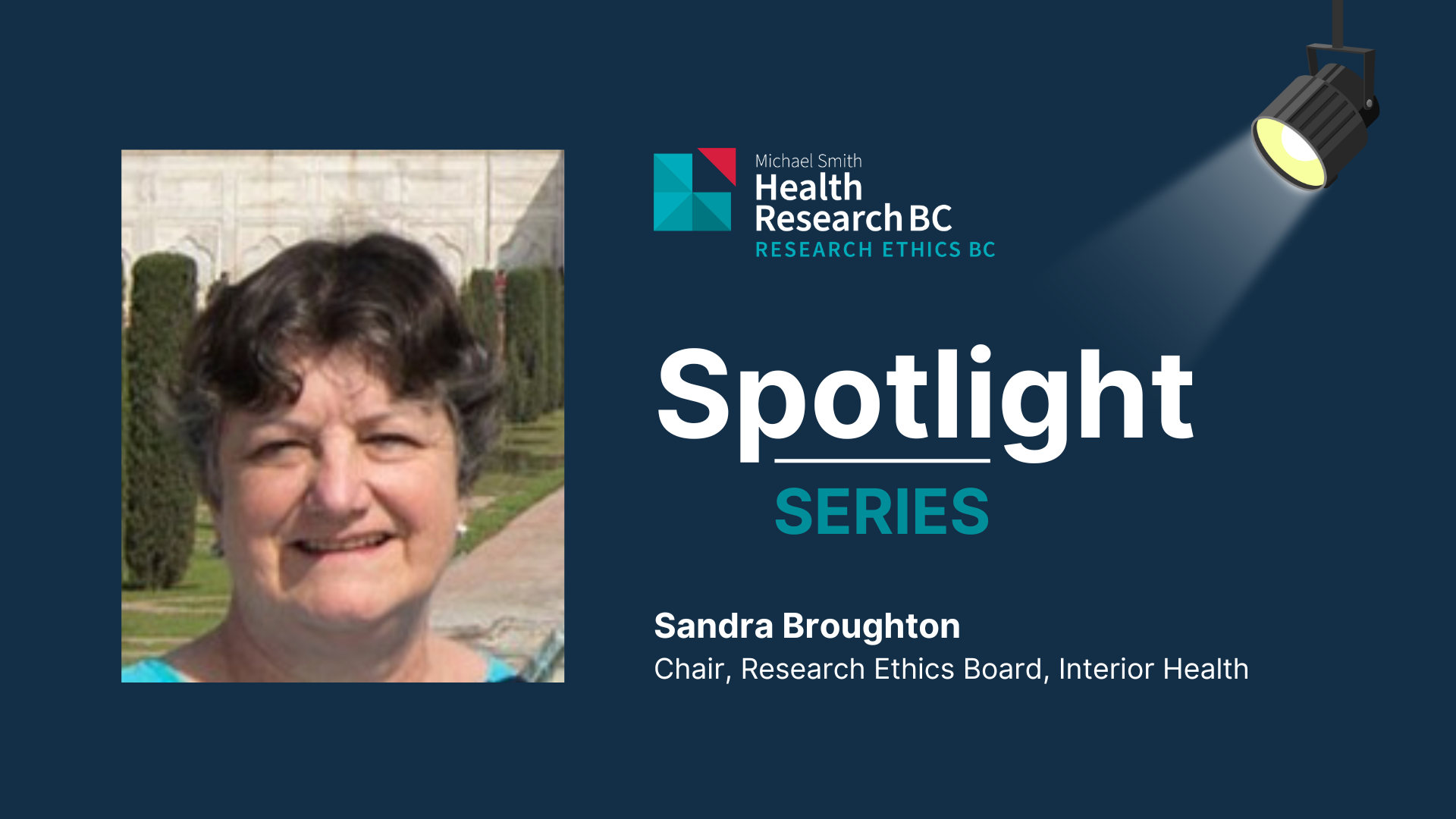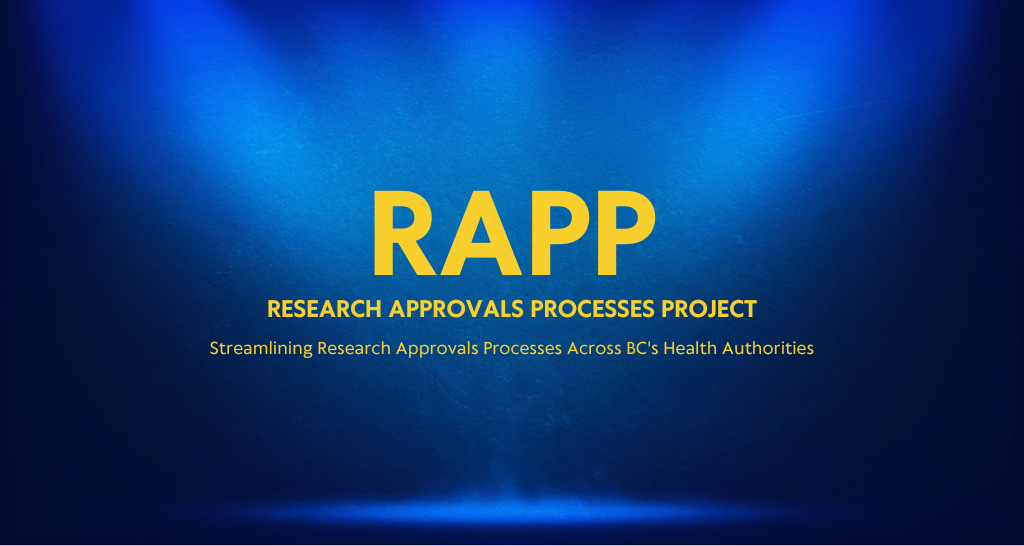Research Ethics Spotlight: Sandra Broughton
6 October 2022

Every few months, Research Ethics BC’s Spotlight Series will sit down with a researcher who is on a research ethics board (REB) to learn more about their career accomplishments, what their research interests are, why they think research ethics are important, and their advice to those interested in research ethics.
For our October edition, we bring you Sandra Broughton, who has spent nearly 40 years in a range of roles throughout the health care sector. Sandra has conducted research across British Columbia as well as internationally. She developed a passion for research from a young age, and later in her career, for research ethics. She has a wealth of knowledge for those interested in pursuing a career in research ethics and is currently chair of the Interior Health Research Ethics Board. Below is the interview with Sandra.
Tell us about yourself and your career
I completed an undergraduate degree at Simon Fraser University, and immediately following graduation, I worked with a professor. He was a fabulous mentor and I credit him for my interest in research. I was a research assistant for a study “Preference and nonreversibility of indifference curves,” which was published in the Journal of Economic Behavior & Organization. After working for a few years, I decided to pursue a master’s degree focused on health care, giving me the knowledge to conduct research in the future.
As a requirement of my master’s degree, I was an administrative resident at the BC Cancer Agency [now BC Cancer], which led to my 25-year career with the organization. Over the years I have been involved in several research initiatives focused on rural-based care, primary prevention, nurse and lay navigators, international palliative care, and international oral cavity cancer. Related to research, within my portfolio at BC Cancer, were palliative care, clinical trials, oral oncology, surgical oncology, as well as clinical research initiatives. The research colleagues I collaborated with, and the variety of research, exposed me to many aspects of research. The valuable experience and insights provided me with the knowledge to transition into chairing the Interior Health Research Ethics Board.
Who or what initially led you to get involved with research ethics?
Becoming involved in research ethics was not a straight path. It started by becoming a co-investigator, collaborating with a colleague from another health authority on a study focused on rural patient navigation in the health care system. A UBC professor provided mentorship to us — asking questions that made us think about how to design and implement the research and how to succeed in obtaining funding. As co-investigator, one of my responsibilities was the submission of the REB application, which introduced me to research ethics. I had some experience with REB applications so I was the team member for our international research responsible for submitting the ethics application locally, and working with our international partners, I learned about institutional review boards in lesser-developed countries.
As my career progressed I changed roles at BC Cancer to provincial clinical trials, pain, symptom management, and palliative care. As a new provincial program, the mandate for clinical trials was efficiency and effectiveness drawing upon LEAN change management and entailed looking at all research components including a good understanding of the work of the REB and applying that knowledge to help researchers with their REB applications.
When I joined the Interior Health REB, I brought my experience as a researcher including submitting REB applications, working closely with the BC Cancer REB, serving on a number of national clinical trials committees with the Canadian Cancer Trials Group, a number of Health Canada site inspections, and graduate education in health ethics and Collaborative Institutional Training Initiative (CITI) training.
I didn’t come with prior experience as a research ethics chair or serving on a research ethics board, but I came with the experience as a member and chair of a health care ethics committee, and with my knowledge and experience as an investigator, leader and committee volunteer.
Why is research ethics important?
To answer this question I think we need to look back in history to where we were 10, 20, or 50 years ago in keeping with the fundamental premise that as collective members of a society we strive to improve based on what we learn and how we enact that learning. Research, as does quality improvement, provides a means to acquire information and/or data to help us understand and improve through knowledge translation the world where we live and work, and specific to health care, those to whom we provide care and support.
Research ethics supports values required for collaborative work between the researcher and participant. Research ethics is also about governance in terms of adherence to national, provincial, and local institutional codes of conduct and policies. It is also about accountability — the researcher to the participant and the participant to the researcher, and to the REB and institute where the research takes place.
When I share that I chair the Interior Health REB, I often find myself providing education about standards, policies and overall terms and conditions for conducting research. I hope this education helps to provide a better understanding of research or demystify research ethics.
Tell us about research you’ve conducted or the kind of research that interests you the most.
The most recent research that I have been involved in is international research, which took place in rural India. In addition to my work with Interior Health, I work part-time for Two Worlds Cancer Collaboration (TWCC), where our work is based in South Asia. TWCC’s vision is to reduce the burden of cancer and other life-limiting illnesses in resource-constrained countries. The mission is to provide education and mentorship for health care providers, and develop equitable and accessible health care programs that improve disease prevention, diagnosis, treatment, and palliative and end-of-life care. When we were reviewing global health data, we noticed that oral cancers in India were significantly higher than what you would see in Canada. TWCC had a partnership in India and, with partners from UBC Dentistry, we began the work to take a Canadian research project to rural India. The research consisted of a feasibility study that led to a pilot project with over 1,200 participants, assessing the oral cavity using oral, white and blue (VELscopeR) light examinations to identify the cancer lesions. The aim of this research was to provide knowledge to the Government of Telangana to implement oral cavity cancer screening; screening that can be done in the rural community by not only dentists but also midwives, nurses or others appropriately trained.
We learned about differences in research in other cultures and working with leaders of the community, and the importance of working with those leaders to recruit participants and ‘political’ collaborations to move the initiative from a few rural communities to many rural communities across the state. Another thing we learned a lot about was adherence to protocols because it was new to some of our partners.
We have published our findings in Cytopathology as “Oral cavity cancer screening and early detection in rural India”. The first article focuses on the specifics of the outcomes in terms of the statistical analysis. The second article focuses on how we could maintain the ethical standards from a Canadian perspective, especially a REB or chair perspective, and be able to participate in future opportunities. It is our intent to take the research project to Sri Lanka and Nepal where TWCC currently has programs.
What advice would you give to those interested in getting involved in research ethics?
I would advise them to look for a mentor who can offer perspectives and guidance. Several students have asked to be a guest at a REB meeting and I welcome their participation as it provides exposure to research ethics, perhaps addressing my earlier comment about demystifying research ethics and leading them to consider becoming a researcher. I also recommend more education and certifications (such as TCPS and CITI), and attending conferences and symposiums hosted by Research Ethics BC (e.g. REB West or Clinical Research Ethics Symposium).
Another experience that helped me during my career in research and research ethics was having the opportunity to be a research assistant. If you can seize opportunities afforded to you — ones that provide for roles in research at certain points in your career — it will help you, even if it is only a one-time exposure.
To those who are interested in research and pursuing research throughout your career, the learning will be continuous. Those who you work with will expand your horizons and working with participants is a privilege.





